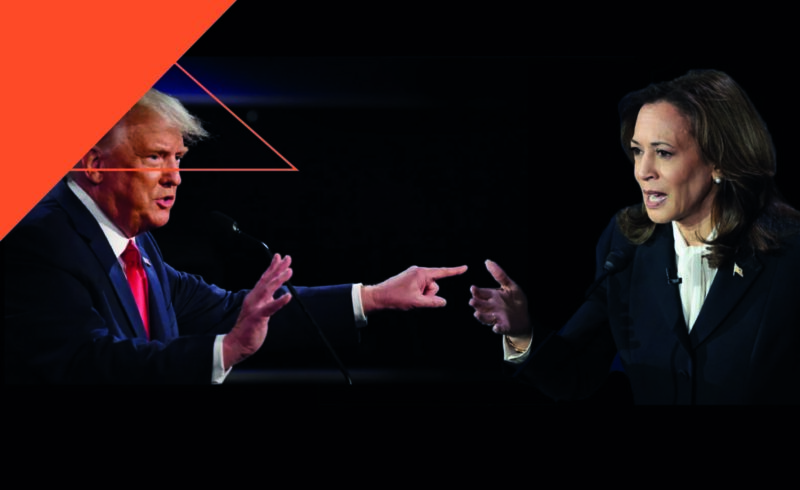With the US election less than 3 weeks away, the potential impact of the next president is a key topic of many conversations.
American policies have the potential to destabilise the global economy, make financial markets unpredictable or supercharge economic growth.
After a particularly tough few years, the upcoming election carries significantly more weight than previous ones. It comes at an especially pivotal moment, considering the ongoing conflicts that are taking place around the world.
For countries and global companies, the spotlight is on the trade policies that will come into play should Harris or Trump become president. Each candidate has specific views and policies that will transform global markets and tariffs.
In this article I explore the trade policies being put forward by both parties and discuss the potential implications on leading manufacturing and procurement hubs around the world.
Democratic Party: 3 Trade Policies under a Harris Administration
Whilst the topic of international trade hasn’t been a focus for Harris so far in her campaign, it is anticipated that she will continue with the trade policies set in place by Biden and the current administration. Key themes of the current administrations trade policies include multilateral cooperation, sustainability, labor rights and tax incentives for domestic production.
1. Reducing Reliance on China
Should Harris win the election, the expectation is that she will continue the previous administration’s position on China, which was focused on de-risking from the country through trade agreements and domestic preference programmes.
Harris is largely a blank slate with regards to China. What we should anticipate is that Harris will maintain existing policies, such as the 301 tariffs that were initially introduced during Trump’s first term, and introduce new ones – that shift more manufacturing operations onto home soil. During a speech at the Economic Club of Pittsburgh, she said the US should lead:
"the world in the industries of the future, making sure America, not China, wins the competition for the twenty-first century”"
2. Introducing New Multilateral Trade Agreements
Building on the efforts to reduce reliance on China, the Biden-Harris administration has also implemented new trade agreements in order to strengthen relationships with other APAC countries. For example:
- The US – Taiwan Initiative on 21st Century Trade, which was created to develop and enhance the use of digital trade infrastructure and promote fair trade practices.
- The Indo-Pacific Economic Framework (IPEF), which was designed to strengthen the trade relationship between the US and its Pacific allies, including India, Indonesia, Japan, Singapore, Thailand and Vietnam.
As Harris continues to define her policy priorities, we can use her previous statements and positions to determine how she would tackle multilateral trade agreements. She’s previously expressed a desire to collaborate with international partners and to build stronger alliances. Harris has also previously highlighted the importance of strengthen US manufacturing and supply chains, with a focus on reducing dependency on a single country.
Taking these into account we should anticipate that, if in power, Harris will continue to strengthen trade relationships with APAC countries (excluding China).
3.Increasing US Manufacturing Operations
Alongside the introduction of new trade policies with China and southeast Asia, the current administration has also introduced new incentives to bring manufacturing operations back onto US soil, with two key policies driving change:
- The CHIPS and Science Act, which provided $50 billion of funding for American semiconductor research and manufacturing. Last month alone saw an investment of $269 million for 33 new technical microelectronics manufacturing projects.
- The Inflation Reduction Act, a considerable effort to bring renewable manufacturing operations back to the US through tax credits for the domestic manufacturing of goods associated with renewable energy.
The combination of these new incentives and the changes to section 301 tariffs has made it significantly more costly to import Chinese semiconductors, which is causing US importers to re-evaluate their sourcing strategies.
Should Harris become president, it is expected that her administration will continue to deliver the CHIPS and Science Act and look for ways to enhance its effectiveness. This could include introducing new safeguarding policies to ensure the funding and tax credits are being properly and fairly allocated. Harris is also likely to further reshoring efforts across the US renewable energy manufacturing industry.
Republican Party: 3 Trade Policies under a Trump Administration
Whilst Harris has a limited footprint and has remained largely quiet on the topic of international trade during her election campaign, we can learn a lot about Trump’s stance from his previous tenure as president, as well as what he has shared in his own campaign for the upcoming election.
1. Introduction of Universal Tariffs
In his first term as president, Trump imposed a number of tariffs on a range of Chinese goods, as well as steel, introducing 7.5-25% duties on imports
Should he regain his presidency, Trump has suggested that he will add to this by imposing universal tariffs of up to 20% on all goods imported into the US. Further to this, he would introduce an additional 60% for all good imported from China.
2.Decoupling from China
Trump has been clear on his stance that the US must decouple from China, completely cutting economic ties with the country. To achieve this, Trump would:
- Significantly increase tariffs on goods imported from China
- Remove the importation of “essential goods”
- Change the de minimis rules to stop Chinese imports entering the US duty-free
In his first term as president, Trump imposed a 25% tariff on approximately $250 billion on imports and an additional 7.5% tariff on approximately $112 billion on imports from China. Trump’s new campaign is yet to share any more details on the proposed new tariffs, so it remains to be seen what these would look like. What is clear is that the higher tariffs being proposed will have a significant impact on the trade deficit with China, as well as the inflationary repercussions for US consumers.
The impact of tighter trade policies with China during Trump’s first term as president created an increased trade deficit with other countries, including Mexico, the EU and South Korea. Should Trump increase tariffs again, we should expect to see a continued shift in production operations to other countries – closing the trade deficit with some, whilst increasing it with others.
The high tariffs introduced during his first term also impacted employment in the US, with close to 250,000 jobs lost as a result of the US-China trade war. Should the trade war continue if Trump wins the election, it has been predicted that the US will lose 320,000 additional jobs.
3. A Return to Bilateral Trade Agreements
Whilst Harris is likely to implement new multilateral trade agreements, Trump has indicated that he would return to more bilateral agreements – something we saw in his first term as president. His previous actions to move the US towards bilateral trade include:
- Renegotiating the North American Free Trade Agreement for the United States-Mexico-Canada Free Trade Agreement
- Withdrawing the US from the Trans-Pacific Partnership
- Initiating free trade agreement talks with the Philippines
- Pushing for the Korea-US Free Trade Agreement to be partially reformed
Should Trump become president again, we should expect that he will continue to deliver a similar trade agreement strategy.
Conclusion & what this means to Proco & Executive Search
As we draw closer to the US election, both parties will continue to ramp up campaign efforts, and we should see them expand on some of the international trade policies they’ve previously discussed. Regardless of who wins the election, it’s clear that the US’ relationship with China will remain strained, with both parties taking a stance of distancing its relationship with the country.
While the world waits for the outcome, organisations are carefully considering their supply chain and procurement strategies to ensure operations are not significantly impacted by the outcome of the election. Working alongside Proco’s TRAC advisory practice, we are currently supporting several organisations across the consumer, industrials and commodities industries as they assess what this will mean to their workforce.
Whilst we might see a slow down over the next few weeks, the overall sentiment is that this pause is temporary. James Gowen, Verizon’s Chief Sustainability Officer and SVP Global Supply Chain & Sourcing addressed the upcoming election at a recent conference. When asked whether Verizon were concerned about the impact of the election on their roadmap, Gowen was clear that it would not impact Verizon’s plans – they would simply adapt to accommodate any new regulations or initiatives.
Like all of our clients, we also need to assess what the outcome of the elections will mean for Proco Group and executive search. With the parties having such polarised policies, it’s tricky to judge. We have offices across all the major regions and a win for either party create vastly different challenges and opportunities, especially for our teams in Mexico City and Hong Kong.
What we are sure about is that regardless of the result, the markets are crying out for clarity and we believe that confidence will result in a serge of new opportunities and provide candidates with the security to commit to their next roles.
Proco Group’s team of experts are helping organisations navigate the complexities of supply chain and procurement talent to plan for the short- and long-term in a post-election world. For a conversation with one of our team about your organisation’s strategy, please don’t hesitate to get in touch.




